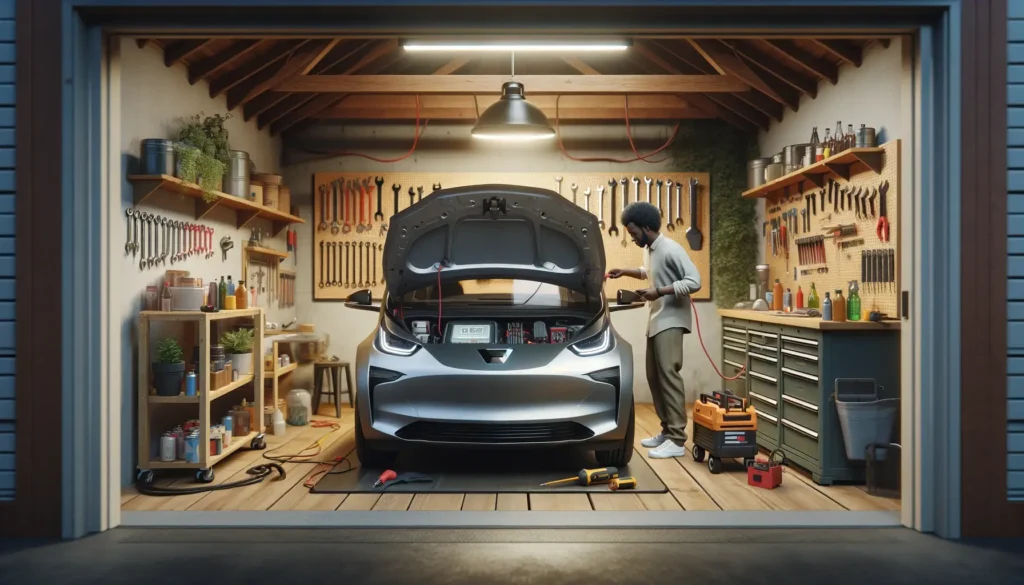The electric vehicle (EV) revolution is in full swing, marked by a steady increase in popularity in recent years. The International Energy Agency (IEA) predicts a remarkable 35% surge in EV sales after a record-breaking 2022. This growing demand can be attributed to heightened environmental awareness, government incentives, and continuous advancements in EV technology. As people recognize the numerous benefits EVs offer over conventional vehicles, including eco-friendliness, impressive performance, and lower operating costs, the automotive industry is rapidly transforming.
However, with the perks of owning an electric car come specific maintenance requirements to ensure optimal performance and longevity. This article explores the key aspects of EV maintenance, offering essential tips to keep your electric vehicle running smoothly for years. If you’re a proud EV owner, read on to discover how to care for your vehicle and, more specifically, how to extend the life of your EV’s battery.
Strategies for Extending Your EV’s Battery Life
Understanding Ideal Battery Lifespan:
The heartbeat of your electric vehicle lies in its battery, a dynamic powerhouse that necessitates careful attention. Battery capacity, a key determinant of an EV’s longevity, gradually diminishes over time. The higher the capacity rating, the more extended your EV will stay charged between charges. Leveraging unique benefits such as regenerative braking, which conserves power during driving, becomes integral to enhancing your EV’s lifetime.
Charging Techniques and Maintenance:
Preserving your EV’s lifespan involves a delicate dance of charging techniques and meticulous maintenance. Charging within the optimal range of 20% to 80% capacity minimizes stress on battery cells, extending their lifespan. Regularly cleaning terminals and utilizing certified chargers further contribute to the longevity of your EV’s vital components.
Investing in Quality:
While upfront costs may be higher, investing in high-quality parts proves financially prudent in the long run. A robust foundation reduces the frequency of repairs, potentially lowering the overall cost per mile compared to traditional gas-powered vehicles.
Let us explore the key aspects of electric car maintenance and provide you with essential tips to keep your electric vehicle running smoothly for years to come.
Regular Maintenance for Optimal Performance
Maintaining an EV is crucial to ensure its efficiency and longevity. Here are some key maintenance tasks that should be performed regularly:
Battery Health and Charging:
As the cornerstone of an electric vehicle, the battery demands vigilant monitoring. Keeping the battery within the recommended temperature range and following charging guidelines prescribed by the manufacturer are non-negotiable practices to ensure optimal performance.
Tire Care and Rotation:
Ensuring the safety and efficiency of your EV involves regular tire maintenance. Routine pressure checks and tire rotations promote even wear, enhancing overall performance and extending tire lifespan.
Brake Check:
While EVs benefit from regenerative braking, sparing traditional brake pads from excessive wear, routine inspections ensure optimal functionality and safety.
Fluid Levels:
Periodic checks of essential fluids such as coolant and brake fluid are vital for the seamless operation of your EV.
Professional Servicing and Expert Assistance
While some maintenance tasks can be performed by EV owners themselves, certain tasks require the expertise of trained professionals. When it comes to servicing an electric vehicle, it’s advisable to:
Following Manufacturer’s Recommendations:
A cardinal rule is adhering to the manufacturer’s guidelines and recommended service intervals. These guidelines are meticulously designed to uphold your EV’s optimal performance and preempt potential issues.
Choosing Certified Technicians:
When the need for professional assistance arises, opting for certified technicians or authorized service centers specializing in electric vehicles is a strategic move. Their expertise ensures effective diagnosis and resolution of EV-specific concerns.
Warranty Considerations:
The manufacturer’s warranty is a protective shield for your investment. Ensuring all servicing within authorized service centers safeguards your warranty and guarantees quality service.
Special Considerations for EVs
While many maintenance tasks for EVs are similar to those of conventional vehicles, there are some unique considerations to keep in mind:
Electric Motor Inspection:
Unlike traditional internal combustion engines, EVs rely on electric motors that do not require oil changes. However, periodic inspections are essential to address any anomalies promptly.
Software Updates:
The sophisticated software systems of EVs control various functions, necessitating regular updates. Keeping your vehicle’s software current enhances performance, safety features, and the overall user experience.
High-Voltage System Safety:
Navigating the high-voltage systems of EVs during maintenance requires heightened caution. Following proper safety procedures and consulting certified electric vehicle technicians for high-voltage system maintenance or repairs is imperative.
In conclusion, the journey of owning an electric vehicle is a tapestry woven with environmental consciousness, technological marvels, and responsible ownership. Properly servicing your EV is not merely a routine; it’s a commitment to optimal performance, longevity, and safety.
By embracing the guidelines outlined in this comprehensive guide, you embark on a journey to maintain your electric vehicle effectively, extend its battery life, and navigate the nuanced considerations unique to EVs.
Regular maintenance, professional assistance when needed, and an unwavering commitment to safety ensures that your electric vehicle not only fulfills your transportation needs but also becomes a beacon of sustainable, future-forward living. In the world of EVs, each maintenance task is a stitch in the fabric of a cleaner, greener, and more electrifying tomorrow.


